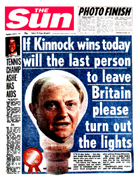 Ever since the 1992 election and the claim that "it was The Sun wot won it" for John Major's Tories, a legend has grown up around the Rupert Murdoch-owned red-top and its perceived level of political influence.
Ever since the 1992 election and the claim that "it was The Sun wot won it" for John Major's Tories, a legend has grown up around the Rupert Murdoch-owned red-top and its perceived level of political influence.In my view, its election day splash on that occasion (pictured left) was probably the single most disgraceful piece of journalism of the last 30 years. So far as I could make out, the only people who had actually said they were going to "leave Britain" if Kinnock won were Andrew Lloyd Webber and Phil Collins, neither of whom would have been any great loss and one of whom later emigrated anyway.
But in what turned out to be a very tight election race that was ultimately decided by a few hundred voters in a dozen or so marginal seats, I would concede that the Sun's relentless rubbishing of Kinnock probably did have an effect.
Now, with another tight race in prospect in 2009/10, there has been much recent comment over the Sun's apparent hostility towards David Cameron, notably from Mike Smithson, whose PoliticalBetting.com is currently the top political blog in my view, and BBC pol ed Nick Robinson.
Both Nick and Mike speculate that the paper has turned decisively against the young Tory leader following his decision to vote for an inquiry into the War in Iraq and his "tough love" speech of last week, citing as evidence this piece in Saturday's paper by Deputy Political Editor Andrew Porter.
But should Cameron be worried? Well, it is certainly the case that, back in the 1970s, The Sun played a big part in bringing its mainly working-class readership on board the Thatcher bandwagon, and as I have already said, its demonisation of Kinnock almost certainly swung a few votes in '92.
I would go further and say that its subsequent decision to back Labour in 1997 - having previously regarded the party as totally unfit to govern - did send out an important subliminal message to the wider electorate about the extent to which the party had changed.
But would a similar decision to back Cameron now send out the same message about the Tories? Probably quite the reverse.
The Sun's recent attacks on Dave have come from the right, lambasting him for failing to support "Our Boys" and for what they see as a "soft" approach to law and order. As everybody in politics knows, this is just exactly where Cameron wants to be attacked from.
It follows, to my mind, that Cameron ultimately has more to gain from not obtaining The Sun's endorsement at the next General Election than from getting Rupert's thumbs-up.
What really made The Sun a great newspaper in its own way was the political culture which spawned it, which gave it ample opportunities for the kind of dragon-slaying that was its forte.
In the 70s it railed against union power, to great and ultimately decisive effect. In the 1980s it was "loony lefties" (including, it should not be forgotten, supporters of gay rights). In the 1990s, it was Europe.
Now, in a political culture in which everyone is falling over eachother in a mad rush for the centre-ground, there is less need or demand for that style of confrontational political journalism.
In short, The Sun has become a newspaper just like any other. Influential, yes - no paper with its number of readers could fail to be. But a maker or breaker of governments and oppositions no longer.
3 comments:
Do you really think that people will vote for David Cameron if he is not endorsed by the Sun!?!
Cameron's current popularity in the polls seems more reliant on despair with Labour rather than a groundswell of positive support for Cameron!
So far he has done nothing to endear himself to anyone. Currently, I'd rather join the 40% of the electorate who don't vote for any of the parties!
Also the Sun had over 4 million readers in 1992. It was teh highest year of its popularity if I remember correctly.
It has 3.2 million today and falling fast.
It will be less than 3 million by 2009.
So at the very least a 25% drop in its influence in any event.
I can't see that Cameron gives a toss about endorsement from The Sun. His increase in support has been from centerist females, few of whom are Sun readers. His big problem is whether the male, middle-class, right of the Conservative party (also not Sun readers) abandon ship the way the white, working-class left are abondoning the Labour party.
Post a Comment